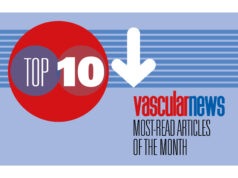
Physician probity was – well – probed in the first Great Debate at ISET this year. The issue in question was “Does clinical investigation ownership/payment influence outcome?” and it certainly stirred up passions among the distinguished panellists. The dilemma mainly seemed to center on the idea of whether the scientific principle of objectivity could be maintained in the face of potential financial or personal rewards.
Dr Barry Katzen, Baptist Cardiac & Vascular Institute, moderated the debate. He pointed out that it is the physicians who define the direction of clinical investigations and who are instrumental in solving any problems. “What is important is the patients’ quality of life not company profit margins.” On the ‘for’ side was John Abele, co-founder of Boston Scientific. He said that “money is neutral, it’s how you use it that is the issue”. Abele added that financial incentives are necessary, and without them the pace of scientific innovation would slow. “If you reward creativity and hard work, you’ll get more in return,” he noted. However, these rewards must go hand in hand with high ethical standards. “You have got to build trust in the system and you do that by being open.” Abele introduced three ethics tests: a ‘golden rule’ – put yourself in the other person’s shoes; a ‘medical golden rule’ – put a family member in the patient’s shoes; and the public disclosure rule of thumb – “How would I feel if this action were published in tomorrow’s newspaper? Or appeared on 60 Minutes?”
Dorothy Abel, from the FDA’s Cardiac Device Panel, commented that trials can be unconsciously as well as consciously affected; anywhere from designing the study to interpreting the results. “Even without that, there can be a perception of a conflict of interest,” she added. From an FDA perspective, the issue of payment is related to the dearth of qualified independent experts who can assess studies of new technologies. For timing too – the FDA only reviews disclosure statements after a study has been completed. Plans need to be put in place to minimize the risk of personal influences on study outcomes, she opined.
From a journalistic point of view, Gregory Zuckerman from the Wall Street Journal admitted that the influence of money on the healthcare system is always big news. Moreover, “So many physicians have conflicts of interest these days…through options, shares, consulting fees, etc.” Zuckerman believes that physician neutrality is a myth – “they are not above influence”. Current standards of disclosure are not good enough, he stated. The patients need to know full disclosure as well. Zuckerman added that he hears stories directly from people in the field, and that from his perspective the situation is worsening.
However, on the other side, Dr Martin Leon, Columbia University, New York, blasted the media for its “rampaging obsession with conflicts of interest” that he claimed threatened to undermine the scientific process. This is not to say that the clinical trial process or patient rights are not sacred, he stressed, but care must be taken not to “disrupt long-standing beneficial relationships”. Leon was not wholly against the motion. He finished by calling upon investigators with financial conflicts to voluntarily limit their involvement with certain aspects of clinical trials. “They can still play an essential role… But there needs to be full disclosure, external oversight and peer review.”













